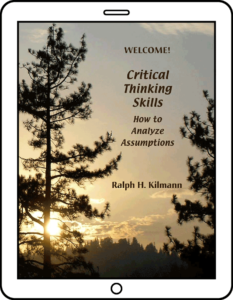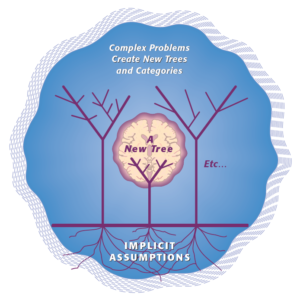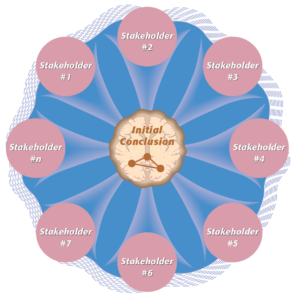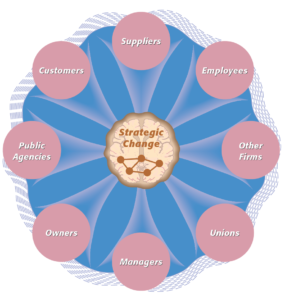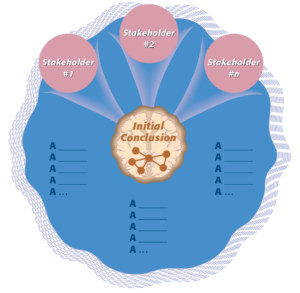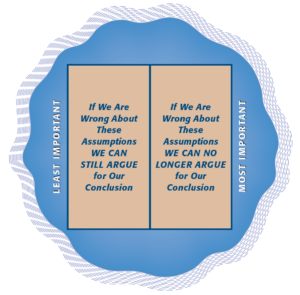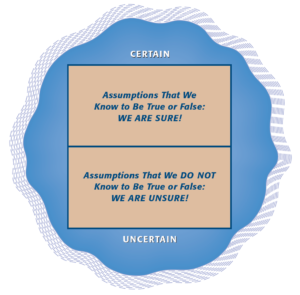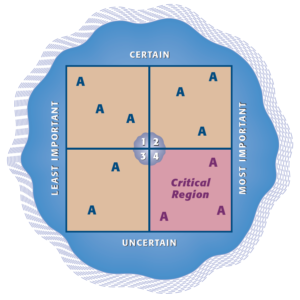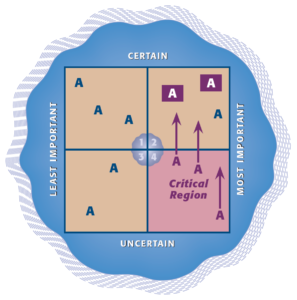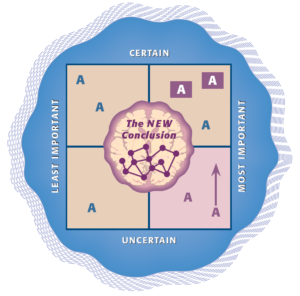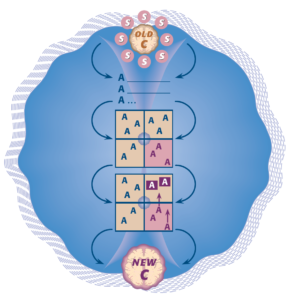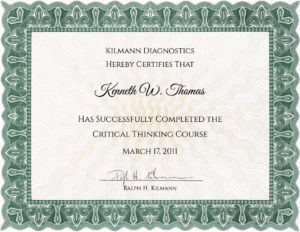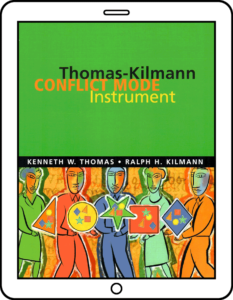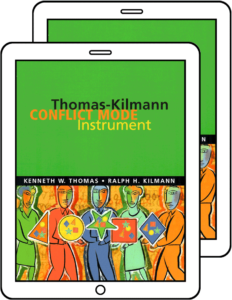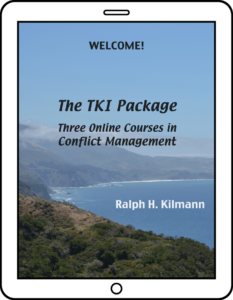FAQs about…
1. PURCHASING AN ONLINE PRODUCT
Can I purchase the PAPER version of the TKI on your website?
As an e-learning business, we naturally specialize in providing the ONLINE version of the TKI, which automatically scores, graphs, and interprets your results. Moreover, there is no shipping cost or time involved with taking the ONLINE TKI after you’ve purchased it. And immediately after you complete your responses to the TKI assessment, you can download your personalized TKI Report. Nevertheless, if you wish to purchase one or more PAPER TKI booklets, we suggest that you go directly to the publisher’s website, The Myers-Briggs Company.
Can I use a Purchase Order for the TKI (or an online course) so I can access that online product and then make my payment to you at a later time? Do you have any installment plans?
Kilmann Diagnostics does not make use of any purchase orders that would give you (or your clients) access to our online products before we receive full payment in advance.
What payment methods can I use to purchase the TKI (or on online course)?
You have several payment options that are based on the dollar amount of your order and your preferred method of payment. To purchase directly on our website, first add the item(s) you wish to purchase to your shopping cart. You can then complete your purchase by using Visa, MasterCard, Discover Card, or American Express.
To purchase any of our online products on the phone, you can call us on Monday through Friday, between 8 a.m. and 5 p.m. Pacific Time, and on Sundays, between 1 p.m. to 5 p.m. Pacific Time at (949) 497-8766. Our offices are closed on Saturdays and national holidays. You can use Visa, MasterCard, Discover Card, or American Express to make your payment, as long as the total amount of your order does not exceed $5,000 (or your charge card limit, if it’s less than $5,000).
For any size purchase (but especially for purchases over $5,000), you can email your order to info@kilmanndiagnostics.com and wire your total payment directly to our bank account. You can also mail a personal or business check directly to Kilmann Diagnostics.
For all our online courses and assessment tools, you must first purchase these products in advance before you can access them on our website.
What if my company (or university) requires an invoice before a purchase can be made?
If you need an invoice for any of our purchasing options, please Contact Us.
What payment options do most of your customers use?
Almost all purchases for 1 to 100 participants are made right on our website with a charge card. Most purchases for larger groups are wired directly to our bank account or are completed on the phone. For very large purchases, we sometimes receive a business check in the mail.
I want to purchase the TKI (or an online course) for another person for the purpose of conducting a coaching session (or providing some online training for someone else). What is the best way to do that?
After you have purchased the one TKI or online course, first download and then complete the KD_Spreadsheet.xls for just this one person. When we receive your Excel spreadsheet, we’ll create a new account for that one person and place the link to the TKI (or the online course) in his or her username account.
Can I purchase the TKI (or an online course) for several participants or a work group?
In your shopping cart, you can enter any quantity of TKIs, online courses, or course collections. After you’ve made your purchase, you need to download, complete, and send us your KD_Spreadsheet.xls. When we receive your completed Excel spreadsheet, we’ll create a new username account for every member in your group and place the link to that purchased item in each account.
If I purchase the TKI (or an online course) for several people, are there group discounts?
There are several quantity discounts for the TKI, depending on whether you purchase 50–99, 100–499, 500–999, or 1000 or more assessments (assigning one TKI per person). These discounted rates are indicated on this web page: TKI Assessment (one TKI per person).
When you purchase a pair of TKIs per person, there are several quantity discounts available, depending on whether you purchase 25–49, 50–249, 250–499, or 500 or more assessments (assigning two TKIs per person). The discounted rates are shown on this web page: TKI Assessment (two TKIs per person).
If you purchase an online course for 5 or more people, the group discount is noted on the separate page for each course: Go to our green horizontal menu bar on top of the page and hover over “COURSES” to select the single online course (or course collection) of interest.
After you enter a qualifying number for “Quantity” in your shopping cart, the total charge for your purchase will be based on the group discount for the TKI (or for an online course).
Other than the quantity discounts that are shown on your website, can you offer an even greater discount for an especially large quantity order?
If you are interested in purchasing an “extra large quantity” of an online product (e.g., a purchase of 2,000 or more TKI assessments or 20 or more online courses), please Contact Us. We might be able to offer you an even greater quantity discount than is currently displayed on our website. However, if we are able to offer you an “extra large quantity discount” for one or more of our online products, such a special offer expires 90 days later—since our operating costs do change over time.
I already purchased an online course, but I now see that I could have purchased a collection of courses at a considerable discount. Is there any way I can upgrade my previous course(s) to The Complete Program or The TKI Package?
We have a cost-effective, risk-free Upgrade Path for our series of online courses: If you have already purchased one or more courses (regardless if these courses are still active or have expired), we’ll give you full credit for what you previously paid toward the purchase of a course collection that includes your previously purchased course(s): The Complete Program or The TKI Package. If you would like to take advantage of our Upgrade Path, please Contact Us.
I plan to purchase the TKI (or an online course) as part of a grant from the U.S. government. Do you have a Unique Identity ID (or a DUNS Number), which is required for such purchases?
The Unique Identity ID for Kilmann Diagnostics is MZ7ZL8DSSMQ5.
The DUNS Number for Kilmann Diagnostics is 968707351.
These numbers have been registered with SAM (System for Award Management) from the U.S. General Services Administration.
2. Accessing an Online Product After Having Purchased It
I just purchased the TKI (or an online course). How do I access it?
First make sure you are logged in to your private account at Kilmann Diagnostics—just in case you logged out after you completed your purchase. On the top right of your DASHBOARD, click on the link “My TKI,” “My Two TKIs,” “My Online Courses,” “My Online Assessments,” and so forth, in order to access your recently purchased item. If you purchased a downloadable file (for example, Workbook Volume I or Logistics Manual), click on “My Downloadable Books.”
Someone purchased the TKI (or an online course) for me. When can I take the TKI (or watch the online course)?
You will receive an email from [no-reply@themyersbriggs.net] or [info@kilmanndiagnostics.com] with one of these subjects: “Your TKI Assessment from Kilmann Diagnostics,” or “Take Your FIRST (or SECOND) Assessment from Kilmann Diagnostics,” or “Your Online Product(s) from Kilmann Diagnostics.” That account email will include a username and a password, which you can then use to log in to our website. After you log in, on the top right of your DASHBOARD, you’ll see one or more of these links: “My TKI,” “My Two TKIs,” “My Online Courses,” “My Online Assessments,” and so forth. Clicking on the available link will forward you to a new page where you can take the TKI(s), an online course, or The Complete Program, the Organizational Courage Assessment, etc.
What if I don't receive an email with my pre-assigned username and password? What if my client (for whom I purchased an item) doesn't receive his username information?
The best way to ensure that you’ll receive our email is to add info@kilmanndiagnostics.com to your Contact Folder or Address Book. Otherwise, if the Firewall setting for your company is very sensitive, your INBOX might not receive our email. Just in case you didn’t add us to your Address Book, please check your SPAM Folder (also called “junk” mail) if you haven’t received our email with your username information. If a few hours have passed since an item was purchased for you and you still haven’t received your username information (after having checked your SPAM Folder), please contact: info@kilmanndiagnostics.com.
3. TECHNICAL TIPS FOR USING OUR ONLINE PRODUCTS
The Course Manual opens in my browser after I insert the password, but why do all the pages come out blank when I print the manual?
For some Internet browsers, it may be necessary to download the pdf Course Manual to your desktop BEFORE you can print it: Don’t try to print the manual when it first opens in your browser.
I have been watching an online course, but am repeatedly distracted by having to wait for the videos to download on my computer. What can I do about these interruptions?
First, it’s important that you address the three alerts for watching any online course on your computer (hardware, software, and Internet alerts). For example, if you have (1) a very old computer with insufficient memory (RAM), (2) an outdated version of an Internet browser, or (3) slow and inconsistent Internet service, our online courses cannot possibly download in a continuous manner.
Second, if you have already addressed the three alerts, then try these technical tips: (1) Reboot your Internet router, which can get “clogged” if you haven’t done that in a long while; (2) reboot your computer, whose memory can become increasingly fragmented over time; (3) close—or do not open—other software applications, so your available memory won’t be drained by other open programs; (4) empty the cache on your Internet browser, so its saved history doesn’t confuse the current video; (5) use an ethernet cable between your computer and Internet router, which might be more stable than the whims of a wireless connection; and (6) if all else fails, try switching your Internet browser, your laptop computer, and/or your physical location (from home or office to Starbucks, etc., which thereby changes your router and Internet service).
Which Internet browsers do you recommend for taking the TKI (or an online course)?
Based on customer feedback, you’re more likely to have the smoothest video streaming and the best sound quality with a recent version of Google Chrome or Microsoft Edge. These software programs are free. CAUTION: Mozilla’s Firefox provides inconsistent audio sound and Apple’s Safari sometimes distorts our videos, so we cannot recommend either of these two web browsers.
4. RECEIVING TKI RESULTS AND MORE ABOUT THE TKI ASSESSMENT
I just completed the TKI. When will I receive my results?
In most cases (except for the one EXCEPTION noted below), after you have completed your assessment on the Elevate platform and have clicked, DONE, you can instantly receive your personalized “TKI Profile and Interpretive Report,” when you click: DOWNLOAD. If you happen to misplace your TKI Report, you can always log back into your private Elevate account and download it again, without incurring any fee.
If someone else purchased the TKI for you (for example, as part of a group purchase), that person may have asked you to forward your TKI report to him or her (for a training workshop, coaching session, or another type of educational program). Please remember to do so!
EXCEPTION: Some TKI facilitators specifically ask us not to allow their one or more clients to download their TKI Reports once they have completed the assessment, since the facilitator prefers to present those results to you in-person or in a live workshop. In those cases, you won’t be able to download your TKI Report from the publisher’s Elevate website as outlined above.
I just purchased the TKI for several participants. What's the best way for me to get a copy of each person's results?
Ask your group members to forward their TKI Report directly to you as soon as they have downloaded it on the publisher’s Elevate website. In addition, you can let us know what specific date you want us to send you a zip file that contains all the TKI Reports for your participants who have completed their TKI assessment.
I have a number of questions about the TKI. How can I get more information?
On our website, we have many full-length articles that discuss specific aspects of the TKI, including its history and validity: Kilmann Articles on the TKI Assessment. One of these articles might be particularly helpful in answering your questions: Frequently Asked Questions About the TKI.
For most of our customers, we provide the online version of the TKI assessment in U.S. English. But we also have two ways (Options 1 and 2) for you and/or your clients to take the online TKI in Latin American Spanish, Brazilian Portuguese, Chinese (Traditional), Chinese (Simplified), Japanese, and Swedish. Option 1 allows you to take the TKI in one of those six languages, but your TKI Report is still written in English. Option 2, as a special order, not only provides the TKI instructions and TKI items in your chosen language, but you can also download your personalized TKI Report in that same written language. For more information, visit: Translations for the TKI Assessment.
5. WHEN TO TAKE OUR ONLINE COURSES
I want to further develop my skills for interpreting other people's TKI reports. Which online course will help me do that?
To get a solid understanding of the TKI Conflict Model, the five conflict-handling modes, and the TKI assessment itself, consider taking BASIC Training in Conflict Management. During this 2-hour recorded course, not only will Dr. Kilmann explain the underlying dimensions of conflict management, but you’ll also learn how to interpret your own and other people’s results.
If you plan on using the TKI assessment in groups, then consider also taking GROUP Training in Conflict Management. This course focuses on learning how to develop and interpret a Group TKI Profile—once you’ve first learned how to develop and interpret individual TKI Profiles in either our BASIC or ADVANCED Training in Conflict Management.
If you want to develop your skills for using the TKI with individuals, groups, AND organizations, consider taking all three of our TKI-based courses at a considerable savings: The TKI Package.
I already purchased an online course, but I now see that I could have purchased a collection of courses at a considerable discount. Is there any way I can upgrade my previous course(s) to The Complete Program or The TKI Package?
We have a cost-effective, risk-free Upgrade Path for our series of online courses: If you have already purchased one or more of our separate courses (regardless if these courses are still active or have expired), we’ll give you full credit for what amount you previously paid toward the regular purchase price (not a discounted price) of a course collection that includes your previously purchased course(s): The Complete Program or The TKI Package. You can also upgrade from The TKI Package of three TKI-based courses to The Complete Program of all our online courses. If you would like to take advantage of our Upgrade Path, please submit the completed form on the bottom of that web page.
Can I take any online course at any time or do you recommend a particular sequence?
The ideal sequence for taking our online courses is (00) Expanding Consciousness, (0) Quantum Transformation, (1) BASIC Training in Conflict Management, (2) GROUP Training in Conflict Management, (3) ADVANCED Training in Conflict Management, (4) Culture Management, (5) Critical Thinking, (6) Team Management, (7) Strategy-Structure, (8) Reward Systems, and (9) Process Management. Technically, you can take any course whenever you like. But just so you know, every later course in the sequence builds upon—and assumes knowledge of—each earlier course. Nevertheless, if you want to initially skip the one or both of our foundational courses (Expanding Consciousness and/or Quantum Transformation) and proceed with the more “hands-on” courses, you can always return to those foundational courses later (so you can then tie all the pieces together). And if you are already experienced with the TKI and conflict management, you can skip BASIC Training and begin with ADVANCED Training and then take GROUP Training. Under special circumstances, you might take Critical Thinking before you take Culture Management. If you want to take all our online courses, we offer a discounted price when you purchase The Complete Program, which presents each course on the same webpage—in the recommended sequence.
I purchased an online course for my entire work group. How can I be sure that my employees actually take the course and learn all the material?
Since each of our online courses includes a Final Exam (consisting of twenty-five, multiple-choice questions), you have the option of ensuring that your group members learn all the key principles and practices by requiring them to pass the exam (by achieving a score of 88 or more out of a possible 100 points). NOTE: The Final Exam on any course can be taken as many as five times, since we wish to encourage all participants to learn the material—not to add stress to their life. But we won’t inform you if any of your group members score less than 88 points on any occasion. We’ll only inform you when your group members pass the Final Exam.
What is the best way to learn your integrated approach to conflict management and change management, so I can improve my skills for organizational development?
First take Expanding Consciousness and Quantum Transformation, which will give you the big-picture understanding of conflict management and change management. Next, if you are still new to the TKI and conflict management, we recommend you next take our two-hour course on BASIC Training in Conflict Management. If, however, you are already well versed in the TKI and its uses, you can proceed with our eight-hour ADVANCED Training in Conflict Management. Once you’ve completed either BASIC and/or ADVANCED Training (so you are skilled at interpreting individual TKI Profiles), take GROUP Training in Conflict Management (when you’ll learn how to interpret the more intricate Group TKI Profiles). Then it will be most important for you to study all the lessons learned so you can pass the Final Exam in each course, especially so you will receive the “Certificate for Advanced Training in Conflict Management.”
The next phase is to take the Culture Management Course, the Critical Thinking Course, the Team Management Course, the Strategy-Structure Course, the Reward Systems Course, and then the Process Management Course, all of which not only make further use of the TKI and conflict management, but will also enhance your growing knowledge of change management and quantum transformation.
If you purchase The Complete Program and then pass the eleven required Final Exams, you’ll earn your Certification in Conflict & Change Management with the Thomas-Kilmann Instrument, which is our highest level of certification. For more details on this option, see: CERTIFICATION.
When you learn all this material (as demonstrated by your passing the relevant final exams), and combine this knowledge with your skills and experience in working with organizations, you’ll be in an excellent position to help your clients go through the same learning process. Lastly, we suggest you study our Optional Readings, since they reinforce all the principles and practices covered in all our online courses.
6. FINAL EXAMS, CERTIFICATES, AND CERTIFICATION
Am I required to take the online Final Exam?
If you purchase any of our online courses for yourself, the online Final Exam is strictly optional: After you complete any course, it’s your choice whether to take the exam so you can test your knowledge of the subject matter. However, if someone else purchased a course for you (your employer, for example), your sponsor might require you to take the Final Exam—just to make sure you completed the course and learned all the material. But keep the following in mind: You have a total of five times to take any exam and receive the necessary 88 out of 100 points to pass it. In case you don’t pass an exam on any occasion (if you receive less than a score of 88), you’re the only one who receives these results. Kilmann Diagnostics will only inform your sponsor when you pass a Final Exam.
Do you provide sample questions from the Final Exams?
To see an actual exam question from each of our 11 online courses, visit: Sample Questions on Our Final Exams.
How can I receive a certificate for completing an online course or certification for the TKI, conflict management, and change management?
Although each of our courses includes an online Final Exam, we currently offer two certificates of completion for our two most rigorous (intellectually challenging) online courses: (1) ADVANCED Training in Conflict Management and (2) Critical Thinking Course. In addition, we offer two certifications for our two course collections: (1) The Complete Program and (2) The TKI Package. You have as many as five times to pass any exam (receiving at least 88 out of 100 possible points on twenty-five, multiple-choice questions).
To receive a personalized “certificate of completion” for (1) ADVANCED Training or (2) Critical Thinking, you must pass the Final Exam after completing the course.
To receive your Certification in Conflict & Change Management with the Thomas-Kilmann Instrument (which is our highest level of certification), you must first purchase The Complete Program and then pass all 11 Final Exams (one exam for each online course).
To receive your Certification in the Thomas-Kilmann Conflict Mode Instrument, you must first purchase The TKI Package and then pass all three Final Exams (one for each course).
PLEASE NOTE: Make sure that the first and last names in your private account on our website are exactly what you want to appear on your earned certificates. After those certificates have been issued and placed on your Dashboard in your private account, we do not reissue those certificates with any name changes.
7. POLICIES FOR COPYRIGHTS, REFUNDS, PRIVACY, RENEWALS, AND UPGRADES
What is your Copyright Policy for your online products?
When you create a username account on our website or log in to your account for the very first time, you must accept all the terms and conditions of our Copyright, Use, and Hold-Harmless Agreement. And then, every time you make a purchase on our website, you must also agree to these same terms and conditions. Our intellectual property allows us to offer unique online services to our customers, so we ask you to accept—and honor—our policies.
What is your Refund Policy for the TKI?
As soon as you purchase the TKI for yourself, you have 90 days to complete this online assessment and download your TKI Report. Within 30 days from the purchase date, if you happen to change your mind for any reason, just contact us and you’ll receive a full refund so long as you have not yet completed the TKI. But we do not offer any refund, in whole or in part, once this initial 30-day period has elapsed or if you have already taken the TKI. NOTE: If you have access to the TKI as part of The TKI Package or The Complete Program, we don’t offer any refund if you choose not to take the “free” TKIs that are bundled with either of our course collections.
We have two options for purchasing the TKI assessment in another language: Option 1 provides the TKI instructions and TKI items in that specified language, yet the TKI Report is still provided in U.S. English. As such, the same refund policy applies to our Option 1 TKI translations as it does for the all-English TKI assessment. With Option 2, however, not only are the TKI instructions and the TKI items provided in the specified language, but the personalized TKI Report is also provided in that same translation. Because of the higher expense that was involved in producing these translated TKI Reports, we do not keep those higher-priced, fully translated TKI Reports in our inventory. As such, you can only purchase Option 2 TKIs from us as a special order, and therefore, once purchased, your Option 2 order is not subject to refunds, in whole or in part.
If you purchase the TKI for someone else (for one client) or for several other persons (for a training program), the TKI’s 90-day expiration period begins as soon as we import your KD_Spreadsheet (which includes the required account information for one or more persons). Within 30 days from the purchase date, if you change your mind for any reason (if, for example, your training program gets cancelled), just contact us and you’ll receive a full refund for any unused TKIs. But we do not offer any refund, in whole or in part, once this initial 30-day period has elapsed or for any group members who’ve already taken the TKI. NOTE: If you purchased The Complete Program or The TKI Package for one or more persons, we don’t offer any refund if they choose not to take the “free” TKIs that are bundled with either of our course collections.
Because making a group purchase allows you to submit fewer names on your KD_Spreadsheet than the number of TKIs that you purchase, there might be a number of open, unassigned TKIs in your account. At a later date, these open TKI slots can be assigned to additional group members through a new KD_Spreadsheet. But if one year has elapsed since the date of purchase and your account still has unassigned TKIs, those open slots officially expire and can no longer be assigned to any persons.
Some of your assigned members might drop out of a training program before their TKI expires. For this case, you have the option of asking us to reassign those unused (but still active) TKIs to your next group purchase—if that purchase is made within that same 90-day period. An initially assigned TKI, however, can be reassigned to another person only once.
NOTE: The same refund policies above also apply to our other online assessment tools (i.e., the Kilmann-Saxton Culture-Gap® Survey, the Organizational Courage Assessment, and the Kilmann Organizational Conflict Instrument), whether you purchase one assessment for yourself or for one or more other participants.
What is your Refund Policy for your online courses, assessments, and downloadable products?
As soon as you purchase any of our courses, assessments, or downloads for yourself or for others, you or your clients will have instant access to these online services. Since it isn’t possible to return any of these intangibles to us, we don’t offer any refunds in whole or in part—nor do we allow any product transfers or participant substitutions—for any of our courses or downloads.
If you purchase any of our online courses, assessments, or downloadable files for someone else (or for several participants), the expiration period begins as soon as we import your KD Spreadsheet. If you have purchased an online course for more people than are listed on your initial spreadsheet, those unassigned courses are valid for one year from the date of purchase. Those open slots can subsequently be assigned to additional members with a new KD Spreadsheet. But if one year has elapsed since the date of purchase and your account still has unassigned online courses or assessments, those open slots officially expire and can no longer be assigned to any persons.
What is your Privacy Policy for creating a username account and making purchases?
Your privacy is very important to us. This notice summarizes the information we collect, how it is used, how it is safeguarded, how it is stored, and for how long we keep it on our secure server:
As part of the purchasing process and keeping your purchases secure in your username account (which includes a unique username and password), we require your first name, last name, email address, city, state/province, country, phone number, company name (optional), and charge card information.
We use this private information for establishing your username account, processing your payments, making refunds (if necessary), handling your billing questions, providing you with invoices or receipts, informing you of discounts and price changes, and asking for your feedback about our online products and services.
We store your private information on a highly secure server for a reasonable period of time (generally, for a few years), so we can respond to your questions about your prior purchases, which includes our being able to extend to you full credit for your prior course purchases whenever you wish to benefit from our Upgrade Path to a relevant course collection. At any time, you can delete your private account on our website, along with your private information.
Only KD personnel have access to your account and information. We will not supply any of this information to any other persons or organizations. We only use this information to process your order and better serve your needs.
I just purchased the TKI (or an online course). When will it expire?
You have access to the TKI for a period of 90 days, starting from the date of purchase (or when your group account was established). Our other online assessment tools (i.e., the Kilmann-Saxton Culture-Gap® Survey, the Organizational Courage Assessment, and the Kilmann Organizational Conflict Instrument) also expire in the same manner. The expiration period for any of our separate online courses is also 90 days. The expiration period for The TKI Package of our three courses on conflict management is six months. The expiration period for The Complete Program of all our online courses is one full year. The same expiration periods apply whether you purchased the item for yourself, made a group purchase, or if someone else purchased it for you.
What if I purchased one of your online products in the past, but it expired before I had a chance to complete it?
If you would like to extend the expiration period for our online courses or course collections, or extend the expiration period for group accounts of two or more TKI assessments (or other assessment tools), for 50% of the current price of these online products, you can renew your private access (or your clients’ private access) for our website’s stipulated expiration period. However, single TKI purchases (or single purchases of our other assessment tools) are strictly excluded from renewal.
As indicated on our website, online courses and assessment tools (including the TKI) expire in 90 days—once they’ve been activated in a private account. Regarding our two course collections, the TKI Package of three online courses in conflict management expires in 6 months, while The Complete Program of all our online courses expires in 1 year—both from the date of activation. Regarding group purchases of our online products, all unassigned slots in a group account (not yet activated in any private account) expire in 1 year from the date of purchase.
If you would like to extend the expiration period for our online courses or course collections, or extend the expiration period for group accounts of two or more TKI assessments (or other assessment tools), for 50% of the current price of these online products, you can renew your private access (or your clients’ private access) for our website’s stipulated expiration period. However, single TKI purchases (or single purchases of our other assessment tools) are strictly excluded from renewal.
As indicated on our website, online courses and assessment tools (including the TKI) expire in 90 days—once they’ve been activated in a private account. Regarding our two course collections, the TKI Package of three online courses in conflict management expires in 6 months, while The Complete Program of all our online courses expires in 1 year—both from the date of activation. Regarding group purchases of our online products, all unassigned slots in a group account (not yet activated in any private account) expire in 1 year from the date of purchase.
Can I apply the amount I previously paid for a single course toward an Upgrade to a course collection?
If you previously purchased one or more of our separate online courses (regardless if those courses are still active in your account or if they have already expired), we offer an Upgrade Path that will apply full credit for whatever amount you previously paid for one or more or our online courses (whether you paid the regular price or a discounted price) toward one of our two course collections—provided that each individual course that you previously purchased is included in the course collection.
For example, you can upgrade from BASIC Training to either course collection, since both course collections include the BASIC course. But you cannot upgrade from the Culture Management Course to The TKI Package, since the latter does not include the Culture Management Course. However, you cannot upgrade from one individual course to another individual course; you can only upgrade to a course collection.
Besides taking advantage of all your previous separate course purchases, you can also receive full credit for your previous purchase of The TKI Package of our three courses on conflict management (whether you paid the regular price or a discounted price) toward the regular purchase price of The Complete Program of our eleven online courses and eight assessment tools—so you can further your knowledge about those additional timeless topics of expanding consciousness, quantum transformation, and change management. However, when you upgrade from our smaller course collection to The Complete Program, you do not receive an additional two TKIs in your account, since two TKIs were already gifted to you when you purchased The TKI Package.
PLEASE NOTE: You cannot receive credit for your previous purchases of any of our other online products (e.g., the TKI assessment) while upgrading to either course collection.
Our Upgrade Path thus allows you to purchase any of our separate courses (or The TKI Package) knowing full well that you can always upgrade your investment at a later time, whenever you wish to benefit from the significant cost savings of our course collections (versus buying each online course separately). Our course collections also include a much longer time period for accessing each course as well as your receiving our highest level of certification when you successfully pass the set of required Final Exams for either The Complete Program or The TKI Package.
Visit Special Payments to see the step-by-step process for purchasing an upgrade to a course collection.
8. FAQs ABOUT THE TKI ASSESSMENT
Is conflict bad?
Since some people have been hurt by conflict, they understandably want to stay away from it—or get rid of it. In fact, some believe the world would be a better place if there were no conflict at all. But once we accept that conflict itself is neutral, we can then see that its goodness or badness is entirely based on how it is handled. Indeed, any conflict can be addressed with respect and dignity or can be approached with anger and malice. But even more important, conflict can be a great opportunity to create better solutions to old problems. Not surprisingly, the TKI has been designed to promote the potential goodness of conflict—how it can be managed creatively—so it can help people satisfy their needs in all kinds of situations.
Is my approach to conflict deeply embedded in my personality or is it something I can easily change?
There is a well-known “equation” in the social sciences: Behavior is a function of personality traits and situational forces. Although personality traits are rather enduring properties of people and thus can’t be changed in the short run (for example, your psychological type, as measured by the Myers-Briggs Type Indicator), the TKI measures how you typically behave in conflict situations, not your enduring personality traits. Although your behavior may be habitual (automatically choosing to behave in a certain way, regardless of the situation), your behavior can also become very conscious and deliberate (carefully analyzing the situation beforehand, considering a range of behavioral options, and then matching your behavior to the situation). Indeed, once you take the TKI, calculate your scores, and profile your results, you’ll immediately become more aware of your behavioral habits in responding to conflict situations. And then, with the TKI’s interpretive materials, you’ll soon develop the ability to assess the key attributes of conflict situations, while knowing which mode best fits with a given situation. With practice, you’ll find it easy to choose behaviors—and quickly change them—depending on the attributes of the situation and what unfolds over time.
Why was the TKI designed with those A/B items?
Before the TKI was developed in the early 1970s, all the other conflict instruments were subject to a strong social desirability response bias: Respondents could easily tell which conflict mode, given how it was worded, had a positive halo (collaborating) and which one’s wording had a negative halo (avoiding). As might be expected, these undesirable halos significantly affected the self-report of conflict-handling behavior. But by pairing modes so each A/B combination is now equal in social desirability (as determined by several research studies), respondents can no longer choose the A or B choice according to which one makes them feel better about themselves (or seem more ideal to others). As a result, people taking the TKI must choose either the A or B item in each pair of statements by selecting the one that more accurately describes their behavior in conflict situations. Note: Even if responding to the A/B items seems cumbersome (probably because of their equal social desirability), your results on the TKI will be more accurate than would be the case if you took any other conflict instrument that hasn’t been carefully designed to minimize such response biases.
Why do items repeat on the instrument?
In real life, you’re always forced to choose which mode to use in a given situation—since you can’t use different conflict modes at the same time. To assess how often (relatively speaking) you typically choose one mode over another, we pair each mode three times with every other mode. Given all the possible combinations, that results in thirty TKI pairs in all. Sometimes the same item for a mode is used more than once, because it remains equal in social desirability with a different item for another mode. Other times, the wording of an item in a pair is modified slightly (or is rewritten completely) to ensure the social desirability of both items remain equal.
Why does the TKI consist of only thirty paired items? Don’t you need more items to accurately measure a person’s conflict-handling behavior?
The accuracy/reliability of any assessment increases rapidly as a second, third, and fourth item are added to the instrument. But after a while, adding more items only slightly increases the reliability of the instrument. In some cases, adding more items after a certain point actually decreases the accuracy of an instrument, because the additional items are adding other information, besides what the instrument is seeking to measure. At the same time, adding more and more items can annoy respondents, because they become tired of answering more questions—which can also distract from the accuracy of the assessment. With the results of several research studies, the total of thirty items on the TKI was shown to be a useful balance between (1) the reliability/accuracy of measuring the five modes and (2) people’s resistance to filling out a long assessment.
What is the reliability and validity of the TKI in comparison to other instruments that claim to measure the same five conflict-handling modes?
The first validity study for the TKI was published in 1977: Ralph H. Kilmann and K. W. Thomas, “Developing a Forced-Choice Measure of Conflict-Handling Behavior,” Educational and Psychological Measurement, Vol. 37, No. 2, pages 309-325. Regarding how the TKI compares to other conflict instruments, also see the 1978 article: Thomas, K. W., and R. H. Kilmann. “Comparison of Four Instruments Measuring Conflict Behavior.” Psychological Reports, Vol. 42, No. 3, pages 1139-1145. From just these early publications, the advantage of the TKI relative to other conflict-handling instruments (developed by Blake and Mouton, Lawrence and Lorsch, and Hall) is impressive—especially in terms of the TKI’s dramatic reduction in the social desirability response bias.
How can it be that people of different gender, race, age, and work experience all compare their scores to the same conflict-handling norms, as shown on the TKI Profile?
Prior to 2007, the TKI Profile was based on the mode scores of 339 middle and upper managers in business and government, who were primarily white males in the United States in the early 1970s. Since 2007, the TKI Profile is now based on a random, stratified sample of 8,000 respondents (drawn from a population of 59,000 respondents) who reflect the U.S. population on gender, race, age, work experience, and geographical location. See CPP’s report, The Technical Brief, for the full study. Remarkably, eight of the fifteen categories (high, medium, and low scores for each of the five modes) changed from the 1970s to the 2000s by only one number, while the other seven categories on the TKI Profile remained exactly the same. Even more striking, there were no significant differences, practically speaking, across any demographic distinction. That’s why everyone in the U.S. can use the one—recently updated—TKI Profile to discover the distribution of their five conflict modes into high 25%, middle 50%, and low 25%.
How can it be that people from different countries and cultures all compare their scores to the same conflict-handling norms, as shown on the TKI Profile?
In 2011, CPP provided its second report on TKI norms: International Technical Brief for the Thomas-Kilmann Conflict Mode Instrument. This exploratory study included 6,168 individuals representing 16 countries: Australia, Brazil, Canada (two samples—English speakers and Canadian French speakers), People’s Republic of China, France, Germany, India, Republic of Ireland, Italy, Japan, Mexico, New Zealand, Singapore, South Africa, Sweden, and the United Kingdom. All respondents, other than those who completed the Canadian French assessment, responded to a number of demographic items prior to taking the TKI assessment. These items pertained to organizational level, employment status, age, gender, years working in current occupation, and satisfaction with current occupation. Although the TKI international research sample of 6,168 respondents from these 16 countries was relatively small as compared to the U.S. sample (59,000 respondents, from which 8.000 were randomly selected), the international study suggested that, as a practical matter, the U.S. TKI norms (in particular, the high, medium, and low categories) do not diverge strongly from those of the countries in this study. Thus it is reasonable to conclude that the current TKI Profile can be used with confidence to interpret results for people of international origin and residence. In the near future, however, as more and more people respond to the TKI worldwide, cross-cultural studies will have a more solid basis (a large, stratified, random sample) for determining (1) whether the TKI Profile (based on the U.S. Norm Sample) needs to be modified to suit different countries or (2) if conflict-handling behavior is indeed so similar across countries and continents that what constitutes high, medium, and low scores on the TKI assessment, practically speaking, does not change much at all.
How can the TKI Profile show me as high on both collaborating and avoiding, when these modes are total opposites in terms of assertiveness and cooperativeness?
When the TKI Profile shows two of your modes as high, it merely suggests that you prefer to use them, probably too much, whenever your needs and concerns are incompatible with another person’s. But don’t try to read an unwarranted logic into these mode combinations, since their use has its own kind of logic. For example, if you come out as both high on collaborating and avoiding, your immediate response to a conflict might be to collaborate with the other person. But if he doesn’t reciprocate in a collaborative manner, your response might be: “I quit. I’m leaving.” Or you might first avoid the scene, unless the other person immediately asks to resolve your differences with a collaborative dialogue. Essentially, what makes being high on both collaborating and avoiding “logical” is simply that you have learned to approach conflict situations from one extreme to another. Indeed, any combination of two or more modes that are high (or low) has its own logic, because that’s the way you’ve learned to manage differences. Stated differently, your highest mode can be viewed as your most preferred mode; your next highest mode might be considered as your backup mode (just in case your preferred mode doesn’t work); and your lower modes are those you are not inclined to use, unless pressed to do so.
Is it harder to tone down your high conflict modes or boast up your low ones?
It’s probably easier to tone down your high modes, because you already know how to use them: You just have to use them less often and with more discernment. Regarding your low modes, however, your first response might be: “How—or why—would I ever use those modes?” This is often the case with the less assertive modes of avoiding and accommodating. Some people wonder why they would leave a situation or give in to someone else. But once they’ve had a chance to study the interpretive materials in the TKI booklet (see a SAMPLE REPORT), they’ll learn when avoiding or accommodating are the perfect choices for a given situation, and how their needs will best be met by using these alternative—unassertive—modes in the right place at the right time. But in such cases, it still might take some extra practice to use what beforehand was ineffectively viewed as either a “coward’s” or a “weakling’s” response to conflict. Similarly, if your low mode happens to be competing, you might first have to overcome the stereotype that “competing is aggressive and selfish,” before you can begin to use the competing mode more often—and more effectively.
Since the instructions to the TKI don’t specify a given situation, do my conflict-handling scores apply equally well to both my personal life and my work life?
The original instructions to the TKI are purposely general, so you can get an assessment of how you approach conflict across all kinds of situations. Some people, in fact, don’t vary their approach to managing differences, whether they are having conflicts with family members or fellow employees. But other people use very different conflict-handling modes in those two situations. To get a better reading on your behavior in these settings, you can respond to the TKI’s items in two different ways. Regarding your work life, use these instructions: “In work-related situations, we sometimes find our wishes differing from those of another person. How do you respond to such situations?” Regarding your family life, use these instructions: “In family-related situations, we sometimes find our wishes differing from those of another person. How do you respond to such situations?” Naturally, you can define other situations in the instructions—whenever you are interested in examining your conflict-handling behavior in a certain setting. Note: No matter how you change the instructions to the TKI, make sure you respond to every item with those specific instructions in mind.
The TKI interpretive materials say that each mode has its place, but I still want to know: What's the best approach for managing conflict?
The best approach for managing conflict is a combination of these four lessons: (1) Know that you have five conflict-handling modes available to you at all times; (2) develop the ability to assess the key attributes of a situation (level of stress, complexity of issue, importance of issue, availability of time to address conflict, level of trust between both persons, quality of listening and communication skills, support from cultural norms and the reward system, and importance of the relationship to both people); (3) use the mode that best fits the situation; and (4) switch to a different mode as the attributes of the situation change.



